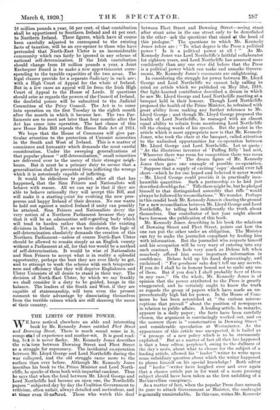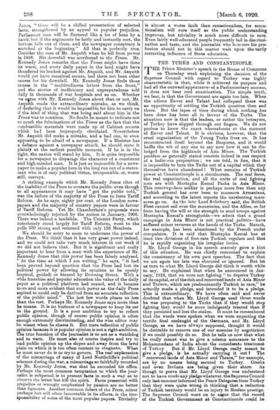THE LIMITS OF PRESS POWER.
WE have noticed elsewhere an able and interesting book by Mr. Kennedy Jones entitled Fleet Street and Downing Street. There is much sound sense in it, comp- 481 of experience and mother-wit. It is good read- ing, bLt it is never flashy. Mr. Kennedy Jones describes the relations between Downing Street and Fleet Street as a struggle for supremacy. The incidental co,-operation between Mr. Lloyd George and Lord Northcliffe during the war collapsed, and the old struggle came more to the surface than ever before. Although Mr. Kennedy Jones inscribes his book to the. Prime Minister and Lord North- cliffe, he speaks of them both with impartial candour. Thus he says that when the feud between Mr. Lloyd George and Lord Northcliffe had become an open one, the Northcliffe papers " subjected day by day the Coalition Government to criticism, often unfair, always detailed and meticulous, and at times even ill-natured.. Those who watch this duel between Fleet Street and Downing Street—seeing stunt after stunt arise in the one street only to be demolished in the other—ask the questions that stand at the head of this prologue." The questions to which Mr. Kennedy Jones refers are : " To what degree is the Press a political power ? Is it a political power at all ? " As Mr.
Kennedy Jones was Lord Northcliffe's faithful collaborator for eighteen years, and Lord Northcliffe has assumed more confidently than any one ever did before that the Press is a political power which can make and unmake Govern- ments, Mr. Kennedy Jones's comments are enlightening. In considering the struggle for power between Mr. Lloyd George and Lord Northcliffe we cannot help calling to mind an article which we published on May 31st, 1919. Our light-hearted contributor described a dream in which he saw Mr. Lloyd George and Lord Northcliffe meeting at a banquet held in their honour. Though Lord Northcliffe proposed the health of the Prime Minister, he refrained with great ability from making any further reference to Mr. Lloyd George and though Mr. Lloyd George proposed the health of Lord Northcliffe, he managed with an almost equal ability to refrain from mentioning Lord Northcliffe till the closing words of his speech. But the point in the article which is most appropriate now is that Mr. Kennedy Jones, who took the chair at the banquet, called attention to the unlimited opportunities for co-operation between Mr. Lloyd George and Lord Northcliffe. Let us quote : " As the illustrious inventor of ' Puffing Billy ' had said, ' Wherever there was room for competition there was room for combination.' " The dream figure of Mr. Kennedy Jones then gave one example of possible co-operation. Suppose that a supply of exciting ' copy ' should ever fall short—which he for one hoped and believed it never would —Mr. Lloyd George could provide it in practically inex- haustible quantities. Such a partnership as he had just described should go far." Tiffs there might be, but he pledged himself to that distinguished assembly that tiffs " would always be followed by reconciliations." We wonder. Perhaps in this candid book Mr. Kennedy Jones is clearing the ground for a new reconciliation between Mr. Lloyd George and Lord Northcliffe, by telling both indifferently the truth about themselves. Our contributor of last year might almost have foreseen the publication of this book. Mr. Kennedy Jones, describing in his book the relations of Downing Street and Fleet Street, points out how the one can put the other under an obligation. The Minister can try to make the journalist compliant by feeding him with information. But the journalist who respects himself and his occupation will be very wary of entering into any such contract. He feels very much as Delane felt when somebody offered him some important information in confidence. Delane held up his hand deprecatingly, mid exclaimed : " For goodness' sake don't tell me any secrets. If you do I shall be in honour bound not to make any use of them. But if you don't I shall probably hear of them in any case." On the whole, Mr. Kennedy Jones is of opinion that the power attributed to the Press is greatly exaggerated, and he certainly ought to know the truth as regards the group of papers which have made an un- precedentedly high bid for power. In the House of Com- mons he has been astonished at " the curious miscon- ceptions that prevail " about the position of newspapers in relation to public affairs. A leading article, he remarks, appears in a daily paper ; the facts have -been carefully chosen, the argument is convincingly worked out, and on the morrow there is " consternation in Downing Street " and considerable speculation at Westminster. As the appearance of this article was unexpected, it is hailed as " a presage of a new policy which is to he strenuously exploited." But as a matter of fact all that has happened is that a busy editor, perplexed, owing to the dullness of the day's news, about what to choose for the subject of a leading article, allowed his " leader "-writer to write upon some subsidiary question about which the writer happened to plume himself on his special knowledge ! Both editor and " leader "-writer have laughed over and over again that a chance article put in for want of a more pressing subject should have been taken as the first unfolding of a Machiavellian conspiracy.
As a matter of fact, when the popular Press does unmask its guns to attack Government or Minister, the onslaught is generally unmistakable. In this case, writes Mr. Kennedy Jones, " there will be a skilled presentation of selected facts, strengthened by an appeal to popular prejudice. Parliament men will be fluttered like a lot of hens by a hawk, but. if the arguments be fairly and instantly met, the bottom falls out of them, and the newspaper conspiracy is scotched at the beginning." All that is perfectly true. Consider the case of Mr. Asquith when he fell from power in 1918. His downfall was attributed to the Times. Mr.
Kennedy Jones remarks that the Times might have done Its worst, and every daily paper in the land might have thundered its loudest against Mr. Asquith, and Mr. Asquith would yet have remained secure, had there not been other causes for his downfall. Mr. Kennedy Jones finds these causes in the " multitudinous letters from the front," and the stories of inefficiency and unpreparedness told daily in thousands of war hospitals and so on. Whether we agree with Mr. Kennedy Jones about that or not, Mr. Asquith made the extraordinary mistake, as we think, of declaring that it would be impossible for him to carry on if the kind of thing that was being said about him in the Times was to continue. No doubt he meant to indicate not so much the fulminations of the Times as the fact that the combustible materials were made up of Cabinet secrets which had been improperly circulated. Nevertheless Mr. Asquith did make a mistake, and a bad one, in even appearing to be afraid of a newspaper. If a Minister has a defence against a newspaper attack, he should state it plainly at the earliest possible moment. If he is in the right, the nation will stand by him. It is quite impossible for a newspaper to disparage the character of a consistent and high-minded man. It is just as impossible for a news- paper to make a popular hero in the long run out of a states- man who is of easy political virtue, irresponsible, or, worse still, corrupt.
A striking example which Mr. Kenndy Jones cites of the inability of the Press to overawe the public. even though to all appearances it may have " got the public cold," was the failure of the majority of the Press to force Tariff Reform. As he says, eighty per cent, of the London news- papers and the majority of country papers were in favour of Tariff Reform. Yet Mr. Chamberlain's proposals were overwhelmingly rejected by the nation in January, 1908. There was indeed a landslide. The Unioniit Party, which notoriously stood largely for Tariff Reform, went to the polls 370 strong and returned with only 158 Members. We should be sorry to seem to underrate the power of the Press. We think that it has very great power indeed, and we could not take very much interest in our work if we did not believe that. But it is significant and really important to hear from a man with the experience of Mr. Kennedy Jones that this power has been falsely analysed. " At the time at which I am writing," he says, " it had been proved beyond question that the Press had lost its political power by allowing its opinions to be openly inspired, guided,• or biassed by Downing Street. With a wide franchise and popular education the value of the daily paper as a political platform had ceased, and it became more and more evident that such power as the daily Press aspired to could only be derived from an accurate reflection of the public mind." The last few words please us less than the rest. Perhaps Mr. Kennedy Jones says more than he means. It is no business of a newspaper to keep its ear to the ground. It is a poor ambition to try to reflect public opinion, though of course public opinion is often enough extremely discriminating, and the wise editor may be wisest when he shares it. But mere reflection of public opinion because it is popular opinion is not a right ambition. The true function of the journalist is to act as a watchdog and to warn. He must also of course inspire and try to lead public opinion up the slopes and away from the level plain on which it is too often content to stagnate. What he must never do is to try to govern. The real explanation of the miscarriage of many of Lord Northcliffe's political schemes during the war, a miscarriage so faithfully recorded by Mr. Kennedy Jones, was that he exceeded his office. Perhaps the most common temptation to which the jour- nalist is subjected is to present facts in such a way as to observe the letter but kill the spirit. Facts presented with prejudice or wrongly emphasized by passion are no better than figments. Another common defect of the Press, minor perhaps but still often lamentable in its effects, is the irre- sponsibility of some of the most popular papers. Triviality is almost a worse fault than sensationalism, for sensa- tionalism will cure itself as the public understanding improves, but triviality is much more difficult to cure. Even fairly well-educated people frequently fail in discrimi- nation and taste, and the journalist who honours his pro- fession should not in this matter wait upon the tardy correcting influence of State education.











































 Previous page
Previous page